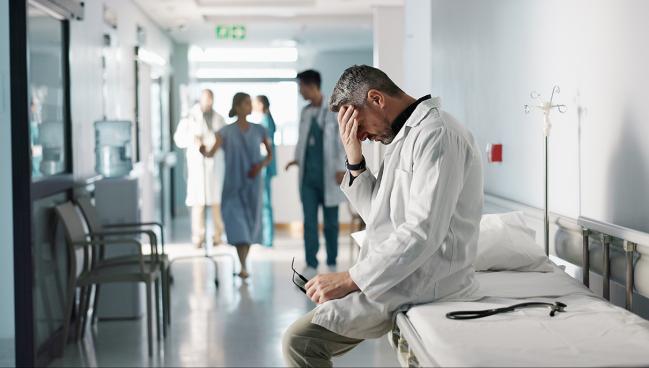Occupational Hazard? CTO Cases Drive Up Operators’ BP, Heart Rates
Interventionalists who perform complex procedures face stress that’s particularly acute, with the potential for long-term harms.

Performing PCI on a chronic total occlusion (CTO), or in fact doing any type of transcatheter intervention, is associated with a significant stress response for the interventional cardiologist beyond what’s seen with their normal workload, according to new observational data. Researchers say their findings, based on blood pressure and heart rate responses during CTO procedures, highlight a potential occupational hazard for physicians to be aware of and manage.
“When I come back after a long day of CTO PCI, I have no strength or power for doing anything, and I feel totally exhausted and I just crash and sleep,” lead author Maksymilian P. Opolski, MD (National Institute of Cardiology Warsaw, Poland), told TCTMD. “Having this kind of stress makes you more prone to different negative things like depression or being nervous during your daily life.”
From radiation exposure to the orthopedic effects of wearing lead protection, the physical tolls of working in a cath lab have been well documented. The emotional response to operating in that high-risk environment, however, is only beginning to be understood. Terms like burnout and work-life balance have entered the medical vernacular, but few solutions have emerged. Interventionalists who perform long, complex interventions face risks that may be particularly acute, this new paper alleges.
Opolski urged his colleagues to do a better job monitoring and managing their stress levels. “That's the main conclusion,” he said. “And it might also explain why we like this procedure so much: because . . . you have this adrenaline and cortisol, which are in a way addictive.”
Commenting on the study for TCTMD, Diego Arroyo, MD (University and Hospital Fribourg, Switzerland), said the findings support a similar analysis he published in the BMJ in 2015. Not wanting to be alarmist, Arroyo said that if only because of the potential for cumulative harm over time, it is important for operators performing complex PCI to be aware of the stress response brought on by these procedures.
Additionally, there’s the potential that this acute response could affect patients, Arroyo suggested. “If you have surges of increased heart rate, increased blood pressure—which are just a surrogate marker of increased stress—can this influence your procedure and your decision-making?” he asked, noting that bankers have a higher proclivity for taking risks when they are stressed.
The Body’s Response to CTO PCI
For the study, published online last week as a research letter in JACC: Cardiovascular Interventions, Opolski and colleagues prospectively monitored the BP and heart rate of five hybrid CTO operators (ages 37, 39, 40, 43, and 63 years) at four institutions. All operators were male, and none had hypertension or cardiovascular disease. They each wore a portable ambulatory BP monitoring device for 10 working days that took measurements at 10- or 15-minute intervals depending on the type of work they were doing, and their time was broken up into three categories:
- Regular work outside the cath lab: 838 measurements
- Non-CTO interventions: 381 measurements
- CTO PCI: 269 measurements
Over the study period, each operator performed eight CTO PCIs, except for one who performed six. The mean J-CTO score for all of these was 1.9, and 82% were successfully recanalized.
Compared with both regular work and non-CTO interventions, CTO PCI was associated with significant increases in both heart rate and mean arterial pressure (MAP).
Ambulatory BP Monitoring Results*
|
|
Regular Work |
Non-CTO Procedures |
CTO PCI |
|
Heart Rate, bpm |
72.3 |
77.8 |
86.6 |
|
MAP, mm Hg |
96.1 |
100.6 |
104 |
*P < 0.001 for all comparisons
Peak heart rate reached over 130 bpm during CTO PCI. Additionally, the duration of CTO PCI directly correlated with higher heart rate (P = 0.002) but not with higher MAP.
Compared with STEMI procedures, CTO PCI was still associated with higher mean heart rate (87 vs 79 bpm). The mean heart rate also was higher for failed versus successful CTO PCI (90.7 vs 85.9 bpm; P < 0.001 for both comparisons).
Potential Reasons Why
Opolski said he was surprised to see a greater stress response with CTO PCI over STEMI procedures because the former “are more about the quality of life of your patients; you are adding life to years and not years to life.”
Arroyo said this is where years of operator expertise could come into play since his study noted an indirect correlation between years of experience and heart rate during procedures. STEMI procedures are “usually technically maybe a little bit easier and maybe a little bit quicker,” he said. “The amount of pressure that you have is not the same as having somebody who is usually doing quite fine, [undergoing an] elective case, and where you are doing something extremely complex that can go wrong and where you need to troubleshoot many, many different things.”
When I come back after a long day of CTO PCI, . . . I feel totally exhausted and I just crash and sleep. Maksymilian P. Opolski
Additionally, Opolski said he did not expect to see heart rates continue to remain as high as they did through the duration of CTO PCI procedures since the greatest difficulty lies in the middle of these cases. The end, by comparison tends to be less challenging, at least for experienced operators. “It might suggest the cumulative effect of repeated stress [lasts] until the very end of the procedure,” he suggested.
Reasons for these high levels of stress markers are likely multifactorial, he said. First, the physical pressures of wearing lead for these often-long procedures will strain even the fittest of operators. Also, the difficulty of these cases places a “high level of mental stress” on operators already tasked with intense attention to detail, and that on top of a comparatively lower procedural success rate and higher rate of complications creates a substantial mental load to bear for these operators, according to Opolski.
The success of CTO PCI is dependent on equipment, skills, and operator personality, he continued. “You have to be the guy who is not afraid of failure because you are going to fail all the time, and there is a mental part behind that,” Opolski said. “In CTO PCI, you can plan, you can calculate the J-CTO score, but at the end of the day, you are mostly surprised. You never can be prepared 100%. Maybe that’s why we like it so much: because it's always something different.”
A ‘CTO PCI Personality’?
Speaking with TCTMD, Rhian E. Davies, DO (WellSpan Health – York, PA), who was not involved in the study, agreed that there might be a level of positive stress at play for operators who find personal fulfillment in doing CTO PCI. “The more you are doing and the more you enjoy it, probably the less of an occupational hazard [the stress] would be,” she said, acknowledging that even though she enjoys doing these procedures, she still feels stress during the most complicated ones or during cases where others have failed.
CTO PCI operators, especially, might share certain personality traits that draw them to the profession. “We all kind of gravitate to something that we like the most,” Davies said. “When it comes to CTOs, you are probably more of somebody who likes complexity or challenges.”
The more you are doing and the more you enjoy it, probably the less of an occupational hazard [the stress] would be. Rhian E. Davies
Arroyo, too, said CTO PCI “does draw people obviously that, on an average, want to be exposed to some form of risk.” While it’s gratifying to see immediate results in some of the sickest patients, he continued, most operators “don't particularly appreciate the huge stress. . . . Many of us would much rather just have a very smooth day and procedures that go really well and simply.”
But the value in this study lies in the fact that it shows a difference among physicians who already supposedly deal with stress well, Arroyo emphasized. “These procedures have an impact on us,” he said, adding that non-CTO PCI operators are at risk as well.
While Davies’ main takeaway from the study is that she likely needs to take more vacation, she noted that anyone working in healthcare likely deals with specific stresses that challenge them above and beyond what others might consider acceptable. “It's just a matter of how frequently we have to deal with that, and as a result, we grow a comfort to it and maybe that even mitigates the higher response that we may see in some folks,” she said.
Harsher Implications
But not everyone grows comfortable with stress. William Lombardi, MD (University of Washington Medical Center, Seattle), told TCTMD this kind of tension over the long-term can destroy careers, and even personal lives.
Be open to the fact that this is taking a toll on you and you need to find safe ways to voice that, and then learn how to handle it. William Lombardi
To combat this, Lombardi called for a complete culture shift that doesn’t chastise operators for their failures but instead fosters understanding and creates learning opportunities. “We’ve built a culture that really is very unforgiving for the fact that we are humans. It makes it even more difficult to do these high-pressure procedures because it puts even more pressure on people to be perfect, which is not really realistic, and it makes it difficult for people to learn because it's not very compassionate if things don't work out the right way,” he said. “People need to feel loved and cared for, and they don't. We have to be invulnerable supermen, and that can be a real problem.”
Failed cases do happen—and when they do, the clinical culture should build up these operators rather than make them feel like “a bad person,” he added.
Lombardi’s advice to physicians feeling the effects of this stress now is to “build a community, and it's probably not at your institution. Be open to talking to people about these cases that are hard. Be open to talking about the complications and learn from them.”
He also urged his colleagues to understand how this stress personally affects them and find healthy ways to manage it. “Don't drink to medicate. Don't fool around with other people to make yourself feel good. Don't be an arrogant prick and beat up on other people because you are so emotionally insecure,” Lombardi said. “Get help, get counseling, get a community, get people around you. Be open to the fact that this is taking a toll on you and you need to find safe ways to voice that, and then learn how to handle it.”
Yael L. Maxwell is Senior Medical Journalist for TCTMD and Section Editor of TCTMD's Fellows Forum. She served as the inaugural…
Read Full BioSources
Opolski MP, Barbero U, Zysk A, et al. Changes in operator’s heart rate and blood pressure during chronic total occlusion percutaneous coronary intervention. J Am Coll Cardiol Intv. 2024;Epub ahead of print.
Disclosures
- Opolski, Arroyo, and Davies report no relevant conflicts of interest.




Comments